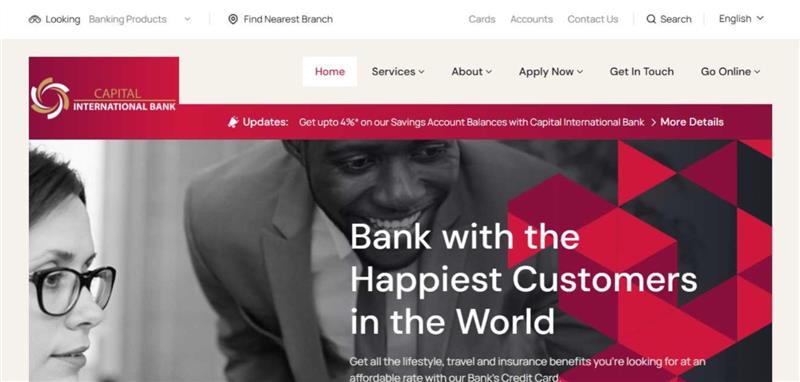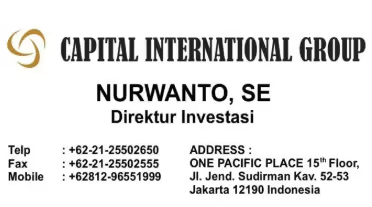Security of our client accounts and data is our number one concern.
As an organisation, Capital International Group (CIG) have a strategic priority to reduce the risk of cyber-attacks and the group has invested heavily in a comprehensive suite of world class cyber defences that protect our business, staff and you, our client.
With cybercrime becoming increasingly prominent and fraudsters constantly developing new approaches, it is extremely important to protect yourself and your assets.
As a member of the public or an existing client of CIG the number one piece of advice is to always confirm the identity of who you are dealing with. Please be aware of the following:
To help support you to be safe online, we have created a quick guide of how you can identify fraud and the required actions to take.
1. On Thursday 18th October, our Cyber Security Team detected a website that has been setup to impersonate that of the Capital International Bank. Please note if you find this website this is NOT our homepage and you should not interact with it in anyway. Capital International Group has no association with the domain capintb.com. Any websites, emails, or documents referencing this domain should be treated as fraudulent.

2. It has come to our attention that an email domain using the name capital-je.co has been fraudulently impersonating Capital International Group. These malicious actors are attempting to mislead recipients into believing that their communications originate from us.
Capital International Group has no association with the domain capital-je.co. Any emails or documents purporting to be from Capital that reference this domain should be treated as fraudulent.
3. We want to bring to your attention a recent incident involving fraudulent emails. Capital has been impersonated by an email domain using the name capital-ion.com. These malicious actors are attempting to deceive recipients into believing that their communications originate from us.
Further guidance on this malicious domain can be found on the IOMFSA website -https://www.iomfsa.im/fsa-news/2019/apr/capital-ioncom.
Please see below for a screenshot example of a received malicious email from this domain, in this example the malicious actor was impersonating David Long, our Co-Founder & CIO:

4. It has come to our attention that an entity operating under the name “PT. CAPITAL INTERNASIONAL GRUP” is fraudulently using the Capital International Group brand, including our logo and corporate identity, to solicit funds and mislead individuals and businesses in Indonesia.
.avif)

.avif)
Capital International Group has no presence in Indonesia and is not affiliated in any way with this entity. Any communications or documents purporting to be from Capital International Group that reference operations in Indonesia should be treated as fraudulent.
5. On Friday 19th October 2024, our Cyber Security Team was made aware of a website that has been setup to impersonate that of the Capital International Group. Please note if you find this website this is NOT our homepage and you should not interact with it in anyway.

6. An unauthorised financial service provider is falsely purporting to trade from Jersey under the name ‘Capital Overseas Investment Bank’. We would like to inform you that this entity has no link to the CIG or any of its subsidiaries.
Name of entity: Capital Overseas Investment Bank
The website: https://www.coinvesb.com/
Email addresses: info@COINVESB.com and customercare@COINVESB.com
The Jersey Financial Services Commission has issued a public statement warding members of the public against dealing with this unauthorised provider. Further details can be found here.
Any person who has had dealings with the scam entity is requested to contact the Jersey Financial Services Commission's Enforcement team.
Knowing what to look out for can help you to stay alert to fraud. Threats often seen in the financial services industry include:
Impersonation of a member of CIG staff:
Impersonation of Brand:
Investment opportunities that are too good to be true:
It is more important now than ever to exercise caution when using the Internet. Breaches of personal accounts are commonplace. We have put together a straightforward guide which may assist you in protecting yourself against fraud.
Signing up to Online Accounts:
It is common for people to have many online accounts for various services.
Passwords and Authentication:
Social Media:
Phishing and Spam:
Roughly 90% of account and data breaches originate with an email.
WIFI:
Do not connect to a WIFI network that does not require a password. The password is used to initialise an encrypted session that is unique to you and your device.
Operating System Updates:
Ensure that your device(s) is running up-to-date operating systems. These updates often contain many security updates that will make it difficult for a bad actor to compromise or breach your accounts/device.
Protecting Your Device(s):
If you are ever in doubt about whether an email or a screen asking for details is genuinely from CIG, do not enter any information or open any links.
If you are an existing client of CIG and suspect fraud on your Capital International Bank Limited account or Capital International Limited investment account, you should contact our Client Services Team immediately on +44 (0) 1624 654200 or through the secure messaging service on our web portal. You can also forward any emails or screenshots to our Group Security at securitythreat@capital-iom.com and then delete the email immediately.
If you are not a client of CIG and you suspect you have been the victim of fraud, you will need to alert the local authority based on your jurisdiction. If you are in the: